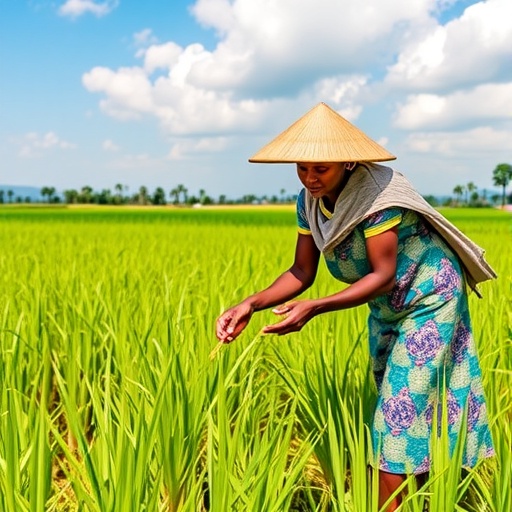Agriculture is a vital sector in many nations, serving not only as a primary source of food but also as a cornerstone of economic development, especially in developing countries. In Tanzania, smallholder farmers play an essential role in agricultural production. However, these farmers often face significant barriers, particularly in accessing the credit needed to invest in their farms effectively. The recent study conducted by Sanka and Makhura sheds light on how an agricultural credit guarantee scheme has influenced rice productivity in the Shinyanga and Iringa regions of Tanzania.
The research identifies the critical constraints that smallholder farmers in Tanzania often encounter, which significantly limit their productivity. One of the most pronounced issues is the lack of access to financial resources. Without sufficient funds, farmers cannot invest in essential tools, seeds, fertilizers, and irrigation systems. The agricultural credit guarantee scheme, designed to mitigate risks associated with lending to these farmers, aims to bridge this financial gap by encouraging lending institutions to provide loans to smallholders who often lack traditional collateral.
Through their study, Sanka and Makhura delve into the implications of this scheme. They utilized a mix of quantitative and qualitative research methods, including surveys and interviews with local farmers, to garner a comprehensive understanding of how the credit scheme operates in practical terms. The data collected reveal that the scheme has made significant strides in improving access to finance among smallholder farmers, facilitating their ability to invest in better cultivation practices and technologies.
Furthermore, the study highlights how the credit guarantee scheme not only enhances individual farmer productivity but also has broader socioeconomic benefits. As rice production increases, it affects local food security, as well as the farmers’ income levels, which in turn boosts the local economy. Increased rice production contributes to greater availability in the market, leading to reduced prices and improved nutritional access for the community at large.
The researchers stress that access to credit should be complemented with agricultural training and support services. While the financial aspect is crucial, it must be paired with knowledge dissemination regarding modern farming techniques and sustainable practices. Sanka and Makhura’s study reflects this understanding, noting that many beneficiaries of the credit scheme also reported participating in training programs that enhanced their agricultural skills.
In some cases, farmers who received credit were able to diversify their agricultural practices, moving beyond traditional rice cultivation to incorporate new varieties or even other crops altogether. This strategy not only helps mitigate risk associated with crop failure but also opens new avenues for growth and sustainability.
The study’s results displayed a clear correlation between the availability of credit and levels of rice productivity. Farmers who participated in the agricultural credit guarantee scheme reported a notable increase in yield as they could invest more resources and labor into their fields. This increase in productivity, however, wasn’t uniform across all demographics. Factors such as the level of education, access to information, and existing agricultural knowledge played a critical role in determining how effectively farmers could leverage the credit.
Sanka and Makhura also examine the challenges encountered in implementing the credit guarantee scheme. Some farmers expressed concerns regarding loan repayment terms and high-interest rates, which can deter participation. The researchers highlighted the importance of creating sustainable lending practices that acknowledge the realities faced by smallholder farmers and provide flexible repayment options.
As the evaluation of the scheme continues, it’s clear that ongoing assessment is vital for its success. The study encourages policymakers to engage with farmers regularly to understand their experiences and gather feedback on how the scheme can be improved. This engagement ensures that the program remains responsive to the needs of smallholder farmers and adaptable to the changing economic landscape.
The implications of this research extend beyond Tanzania’s agricultural sector. It serves as a model that can potentially be replicated in other developing nations facing similar challenges in agricultural financing. Implementing successful credit guarantee schemes could provide the necessary support to elevate smallholder farmers, ultimately driving broader economic development.
The long-term sustainability of agricultural credit programs relies on meticulous planning and evaluation. Future policies should incorporate analyses of ongoing data, including demographics, yield improvements, and economic impacts, to enhance the efficacy of such schemes. An iterative approach allows for continual learning and adjustment based on what works and what doesn’t.
As the study by Sanka and Makhura concludes, fostering an environment where smallholder farmers can thrive is crucial for the entire ecosystem of agriculture in Tanzania. Implementing robust financial support systems, such as agricultural credit guarantee schemes, can invigorate the agricultural sector, empower farmers, and contribute to the country’s economic resilience.
In summary, the research encapsulates a holistic approach to understanding the dynamics of agricultural credit in Tanzania. The findings emphasize the need for coordinated efforts that blend financial access with education and support to empower farmers. Ultimately, as smallholder farmers gain the tools and resources they need, the ripple effects contribute to the overall health and viability of the agricultural landscape in the nation.
Subject of Research: Impact of agricultural credit guarantee schemes on rice productivity.
Article Title: Impact of smallholder farmers’ agricultural credit guarantee scheme on rice productivity in Shinyanga and Iringa regions, Tanzania.
Article References:
Sanka, M., Makhura, M.N. Impact of smallholder farmers’ agricultural credit guarantee scheme on rice productivity in Shinyanga and Iringa regions, Tanzania. Discov Agric 3, 175 (2025). https://doi.org/10.1007/s44279-025-00351-z
Image Credits: AI Generated
DOI:
Keywords: Agricultural credit, smallholder farmers, rice productivity, Tanzania, Shinyanga, Iringa, economic development, financial access.




